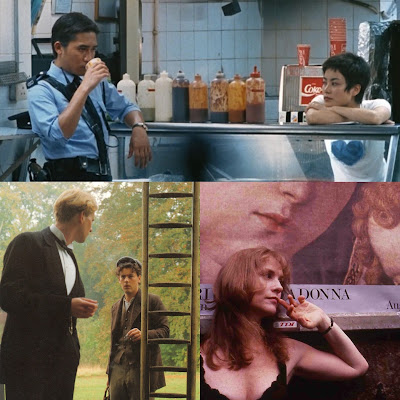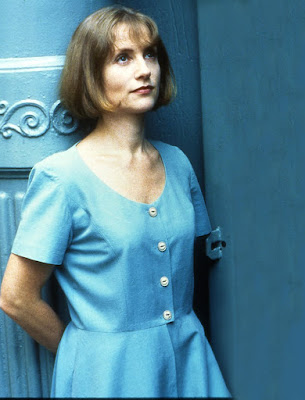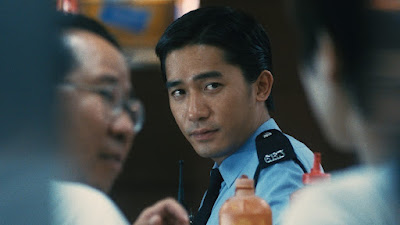Chungking Express (c) Criterion / Maurice (c) Cohen Media Group / Amateur (c) Possible Films
As summer ends (on Labor Day in Hollywood terms – it doesn’t officially end until September 22), the films in theaters are rather bleak, so I decided to look back on three films by master filmmakers, who made me love the art of cinemas, at various points in their careers. I’ve seen these films many times since their premieres but not much in the past ten years. Each has returned either on streaming or physical media. My fear? One or more of these influential films haven’t aged well. Let’s see.
Amateur
Blu-Ray from Possible Films and streaming here
Background: Hal Hartley is probably the least known auteur of the three, yet his films made me love New York filmmaking. He creates quirky, idiosyncratic films, mostly about New York and Long Island, at least at the start of his career. His first, “The Unbelievable Truth,” was very low budget and starred Adrienne Shelley and Robert John Burke in one of their first movies. His second film, “Trust,” gained him attention as did his third movie, “Simple Men,” his first film to play at the Cannes Film Festival. His work is simply shot but has the most unique dialogue style and cadence. 1994’s “Amateur,” his fourth movie, was his most ambitious, as it was the first time he cast a star in the leading role instead of someone from his reliable troupe of actors, which included early-in-their careers Martin Donovan, Parker Posey and Edie Falco. After his anthology film “Flirt,” which had stories filmed in Germany and Japan as well as New York, Hartley had his big breakout film, “Henry Fool,” which won the screenplay prize at Cannes in 1998. Since then, he has continued to make quirky films of varying degrees of success, with most now crowdfunded and almost as bare-budget as his earlier films. I have contributed to many of his projects including the box set that “Amateur” is part of. One of my favorite life moments is actually being in one of Hartley’s movies as an extra, with no dialogue but prominently seen in the final cut.
Amateur (c) Possible Films
Review: Martin Donovan plays a man who wakes up in the middle of a Manhattan street, bloodied and without his memory. He is rescued by an ex-nun named Isabelle (Isabelle Huppert) who is supporting herself writing hardcore stories for a pornographic magazine. Meanwhile, Sofie (Elisa Löwenstein), who is somehow connected to the mysterious man, is embroiled in some shady international crime dealings involving floppy discs (remember them?). Their paths soon cross as Isabelle is convinced she is supposed to save Sofia as a sign from the Virgin Mary. Huppert, who was a big star in French cinema at the time and wouldn’t really become big in the US until “The Piano Teacher,” is quite wonderful here with Hartley’s dialogue and deadpan delivery. My favorite Hartley lines I constantly quote from this film? “How can you be a nymphomaniac and never had sex?” “I’m choosey.” This time around, my favorite line is “When I make mistakes, they tend to be big ones.” It was great to see cameos from way-too-young Parker Posey, Michael Imperioli and Tim Blake Nelson. The movie is as quirky and enjoyable as I remembered it, but the slapstick violence, mostly involving Damien Young as a man protecting Sofia, is a bit much. While I think “Simple Men” is still my favorite of Hartley’s films, this is his most accomplished and complex. Hopefully it will show up on a streaming service soon, but as of now, you can only see it as a Blu-Ray box set that is sold on Hartley’s website.
Chungking Express
On Blu-Ray and HBO Max
Background: Like most cinephiles, I first discovered director Wong Kar-Wai with his indie smash “Chungking Express” from 1994, years before giving us his masterpiece, “In the Mood for Love” in 2000. Like Baz Luhrmann, Danny Boyle and fellow countryman John Woo, Wong has a unique vision and flair for the dramatic. “Chungking Express” was Wong’s fourth film and is made up of two short films that share the same setting as well as the theme of unrequited love and how it makes fools of us all. Wong has said his next film, “Fallen Angels,” was supposed to be the third film in what was then a “Chungking Express” trilogy. Criterion recently released a box set of Wong’s films, remastered and tinkered with by the director. Some of those new versions, including this one and his gay drama, “Happy Together,” which won him the Best Director prize at Cannes in 1997, have found their way to HBO Max but not yet to general streaming.
Chungking Express (c) Criterion






